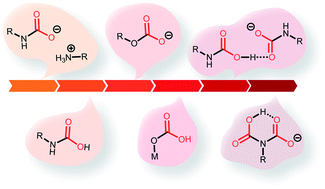New chemistry for enhanced carbon capture: beyond ammonium carbamates
Abstract
Carbon capture and sequestration is necessary to tackle one of the biggest problems facing society: global climate change resulting from anthropogenic carbon dioxide (CO2) emissions. Despite this pressing need, we still rely on century-old technology—aqueous amine scrubbers—to selectively remove CO2 from emission streams. Amine scrubbers are effective due to their exquisite chemoselectivity towards CO2 to form ammonium carbamates and (bi)carbonates, but suffer from several unavoidable limitations. In this perspective, we highlight the need for CO2 capture via new chemistry that goes beyond the traditional formation of ammonium carbamates. In particular, we demonstrate how ionic liquid and metal–organic framework sorbents can give rise to capture products that are not favourable for aqueous amines, including carbamic acids, carbamate–carbamic acid adducts, metal bicarbonates, alkyl carbonates, and carbonic acids. These new CO2 binding modes may offer advantages including higher sorption capacities and lower regeneration energies, though additional research is needed to fully explore their utility for practical applications. Overall, we outline the unique challenges and opportunities involved in engineering new CO2 capture chemistry into next-generation technologies.

- This article is part of the themed collections: Most popular 2021 catalysis articles, 2021 and Chemical Science Recent Perspective articles


 Please wait while we load your content...
Please wait while we load your content...